This is the second of a three-part series introducing readers to the newly appointed senior vice president for Medicine and dean of the UAB Heersink School of Medicine, Anupam Agarwal, M.D. (read part one here.) For this installment, we talked with Agarwal to learn more about his medical training and the path that brought him to the U.S. Look for the final installment—where we’ll learn about Agarwal’s vision and plans for the Heersink School of Medicine—in the coming weeks.
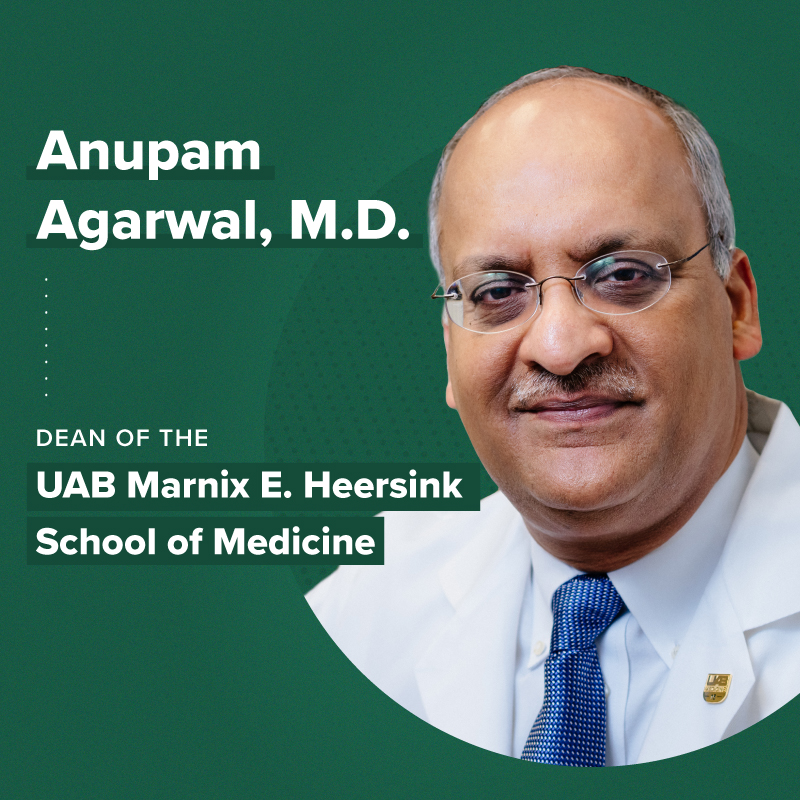 In India, students start medical school after 12th grade, so Anupam Agarwal, M.D., who was recently appointed dean and senior vice president for Medicine of the UAB Marnix E. Heersink School of Medicine, started medical school at Kasturba Medical College at the University of Mangalore at age 18. While completing the Indian standard of six years of medical school, including a compulsory one-year rotating internship, he considered a number of specialties but ultimately settled on nephrology after encountering one of his earliest mentors in medicine.
In India, students start medical school after 12th grade, so Anupam Agarwal, M.D., who was recently appointed dean and senior vice president for Medicine of the UAB Marnix E. Heersink School of Medicine, started medical school at Kasturba Medical College at the University of Mangalore at age 18. While completing the Indian standard of six years of medical school, including a compulsory one-year rotating internship, he considered a number of specialties but ultimately settled on nephrology after encountering one of his earliest mentors in medicine.
Agarwal decided to specialize in nephrology based on conversation with Brian Pereira, a nephrology fellow, who argued that, “You can help patients through kidney transplantation and dialysis and their life is transformed. You can work in the intensive care unit managing acid-base, fluid, and electrolyte disorders and also take care of general medicine patients.’”
Getting into residency training in India at that time was a different process than in the U.S. “The Postgraduate Institute of Medical Education and Research in Chandigarh in northern India is a premier institution with a rigorous selection process for all the residency programs offered. Getting into residency required completing an application based on your medical school performance and scores, which was worth 30 points. Applicants would then complete a three-hour multiple-choice exam on a Saturday. The results based on the combined scores of your application and the written exam were announced on Sunday. On Monday, 40 students were invited to take a clinical exam vying for only eight spots in internal medicine residency.”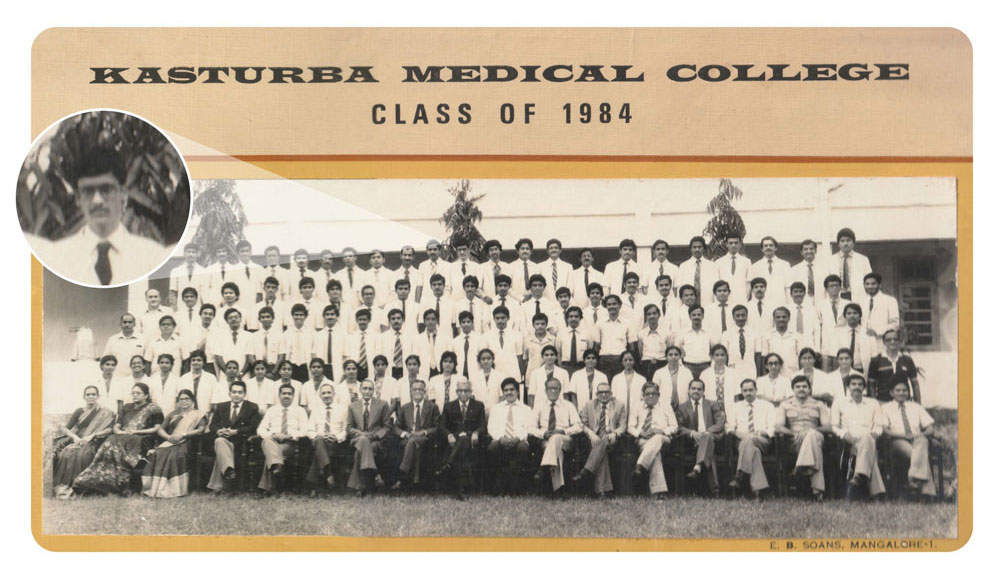 Anupam Agarwal with his medical school graduating class.
Anupam Agarwal with his medical school graduating class.
“You had real cases for the clinical exam, and you were graded on your physical examination skills to make the right diagnosis without talking to the patient. On Tuesday afternoon all the applicants gathered in a theatre style lecture hall to see if they got in. They started reading out the names and I was fortunate to hear my name called as one of eight residents for internal medicine, so I was very relieved.”
Another influential mentor during Agarwal’s residency training was the late Dr. Kirpal Singh Chugh, considered the father of nephrology in India. Agarwal remembers Chugh as being very patient-focused and having high expectations for his trainees. “Dr. Chugh was an exceptional teacher and mentor. He was very academically oriented. We’d be on rounds and he’d see a patient and say, ‘This is an interesting and unusual case presentation, we need to write this up and publish it so people can learn about it. Why don't you write this case?’ Then a week later he’d ask, ‘Where is this case report? I’d like to review it by tomorrow.’”
Charting a New Path
Agarwal completed three years of residency in internal medicine and three years of fellowship training in nephrology at the Postgraduate Institute of Medical Education and Research in Chandigarh. Then he encountered a roadblock that set him on a new path.
“Academically at that time you couldn’t do much in terms of research in India, and my brother, who was in the U.S. already, suggested that I do additional training in the U.S.” Agarwal says.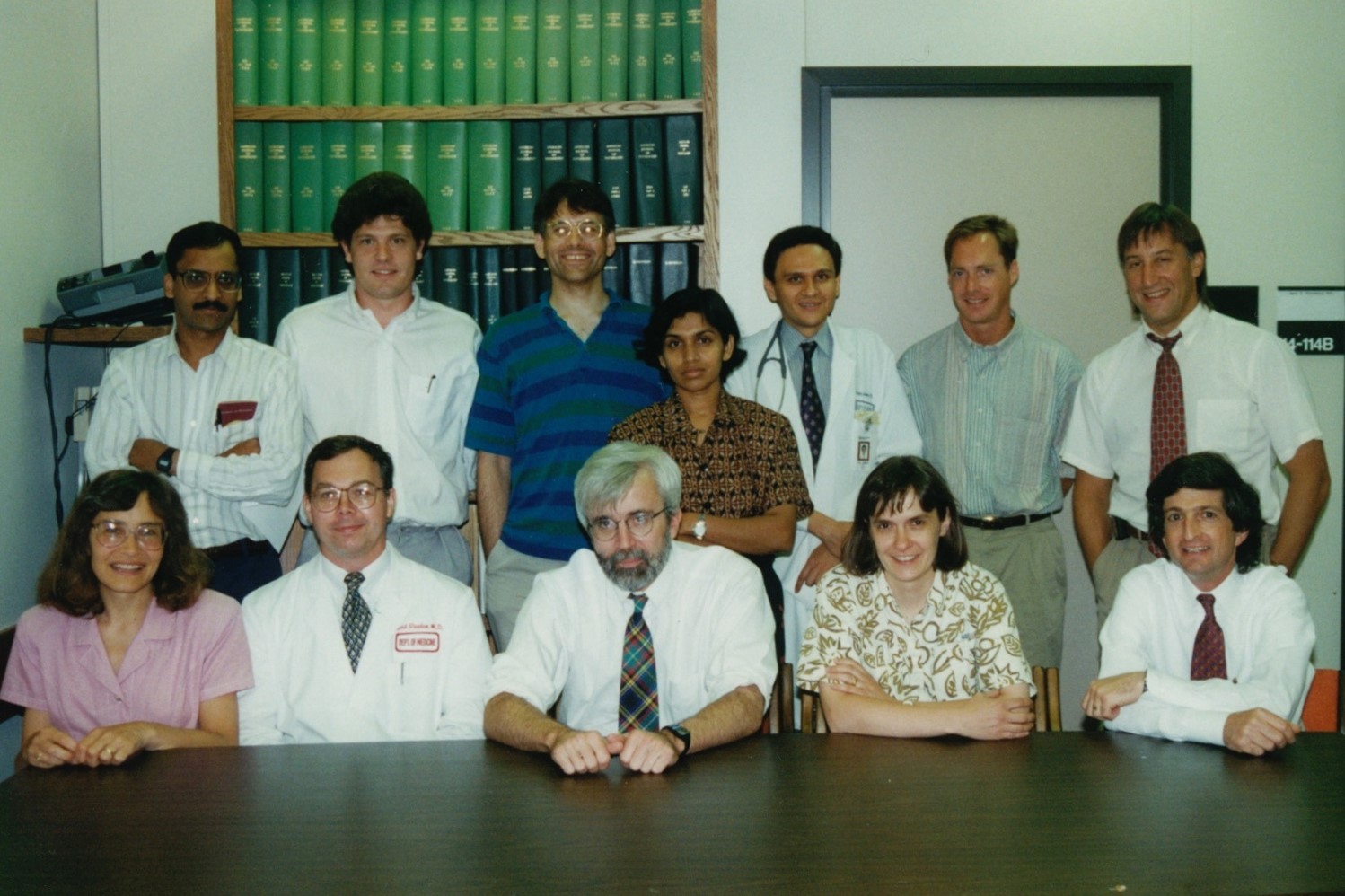 Agarwal (top left) during his fellowship in the Division of Nephrology at the University of Minnesota.
Agarwal (top left) during his fellowship in the Division of Nephrology at the University of Minnesota.
After passing the USMLE exams, Agarwal had a phone interview with the University of Minnesota. He was offered a fellowship position and was mentored there by Karl Nath, M.D., now at the Mayo Clinic in Rochester. “Karl was a most amazing and caring mentor. He took me into his lab, and I had never done basic research before, only clinical research. But it was a great experience—in those two years I was fortunate to have published three review articles and three first author papers.”
Agarwal spent three years as a nephology fellow at Minnesota and another year at the University of Florida in Gainesville, as a postdoctoral fellow/instructor in the lab of molecular biologist Harry Nick, Ph.D., where he met his wife, Lisa Curtis, Ph.D. The two were married in 2002.
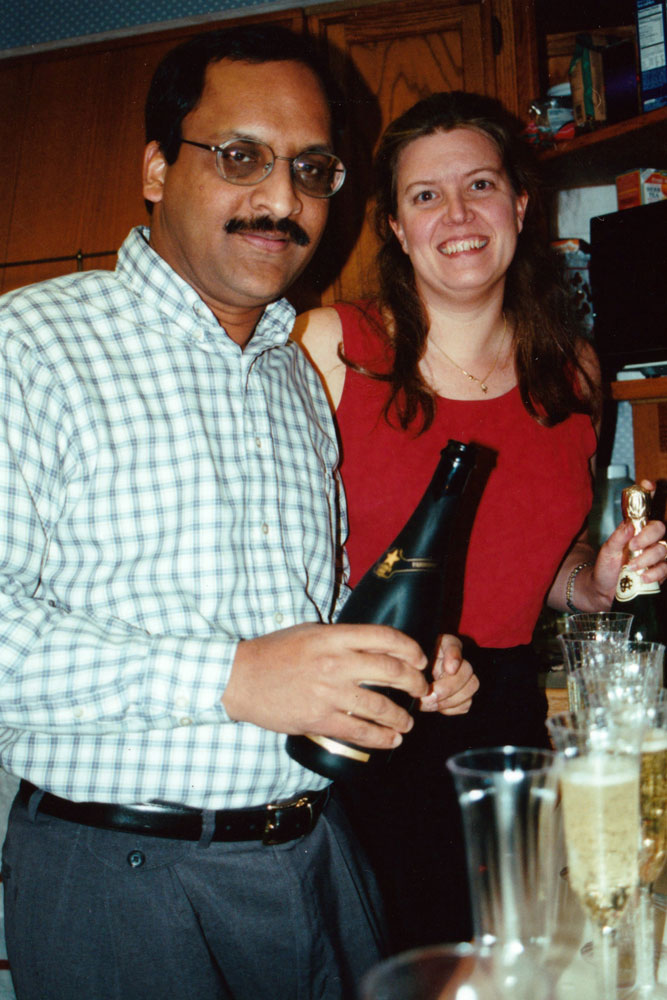 Agarwal met his wife Lisa Curtis during a fellowship at the University of Florida.Then in 2003 he was recruited to UAB by the former Director of Nephrology David Warnock, M.D. “I was pretty skeptical of coming at first but Lisa and I were really impressed on my visit.”
Agarwal met his wife Lisa Curtis during a fellowship at the University of Florida.Then in 2003 he was recruited to UAB by the former Director of Nephrology David Warnock, M.D. “I was pretty skeptical of coming at first but Lisa and I were really impressed on my visit.”
“It was the collaborations and the impressive medical school and health system that really excited me; I could see how quickly you could enable interactive collaborations here. Bruce Freeman, Ph.D., who was the vice chair for research of anesthesiology at the time, really influenced our decision to come. We initiated a collaboration even before I had moved to UAB—work that was subsequently published in the Proceedings of the National Academy of Sciences.”
Putting Down Roots
The following year brought another landmark moment for Agarwal. “In 2004, I went to the federal courthouse in downtown Birmingham to get my U.S. citizenship conferred. There were about 160 of us from many different countries, and the judge said, ‘I want you all to know that just like you, my great-grandfather once sat in a crowd just like this.’”
Agarwal joined the Division of Nephrology as an associate professor and director of the Nephrology Research and Training Center, which had been established by Thomas Andreoli, M.D., in 1976. He was promoted to the rank of professor of Medicine in 2005 and went on to direct the NIH-funded O’Brien Center for Acute Kidney Injury Research, one of eight such centers in the nation.
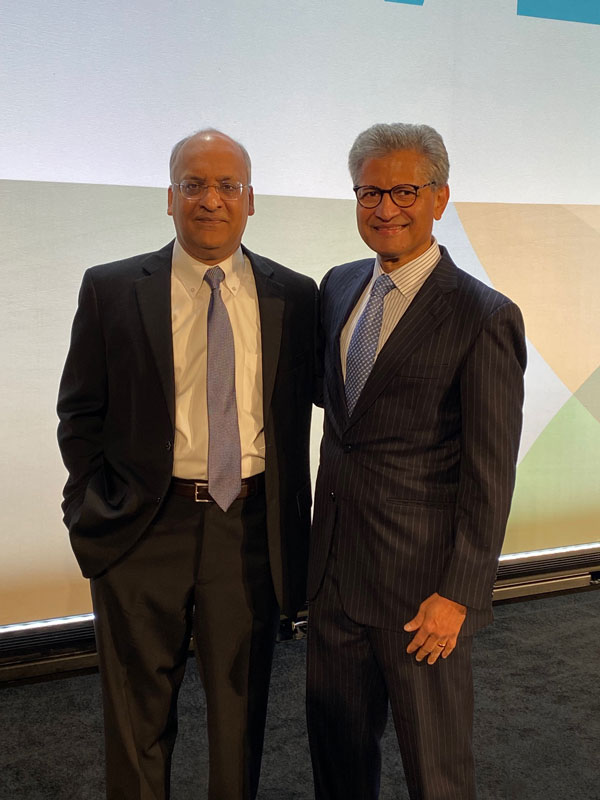 Agarwal with one of his earliest medical mentors, Brian Pereira, in 2022.In 2008, Agarwal succeeded Warnock as director of the Division of Nephrology, a position he held until 2021. In 2014, he was appointed to the newly created role of executive vice dean of the Heersink School of Medicine, where he worked closely with former Senior Vice President for Medicine and Dean Selwyn Vickers, M.D., FACS, and the dean’s leadership team. Upon Vickers’ departure, Agarwal was the natural choice for interim dean, having previously served in the role when the search that resulted in Vickers’ appointment as dean was underway.
Agarwal with one of his earliest medical mentors, Brian Pereira, in 2022.In 2008, Agarwal succeeded Warnock as director of the Division of Nephrology, a position he held until 2021. In 2014, he was appointed to the newly created role of executive vice dean of the Heersink School of Medicine, where he worked closely with former Senior Vice President for Medicine and Dean Selwyn Vickers, M.D., FACS, and the dean’s leadership team. Upon Vickers’ departure, Agarwal was the natural choice for interim dean, having previously served in the role when the search that resulted in Vickers’ appointment as dean was underway.
In 2020, Agarwal became president of the American Society of Nephrology (ASN), the leading organization of nephrology health care professionals with more than 20,000 members representing more than 120 countries.
“I never thought in my wildest dreams when I first came here 30 years ago that I would be president of the ASN, the director of Nephrology, and now dean. I think one takeaway and lesson I have learned throughout my life has been knowing that I had to make the most out of the opportunities that came to me. I am forever grateful for all the opportunities that have been given to me.”
Now that he has been appointed dean, Agarwal says he intends to continue seeing patients at the Birmingham VA Medical Center. “I usually do inpatient consult service for nephrology, mainly in the intensive care unit. I really enjoy doing that so I hope to continue interacting with residents and fellows on the clinical service.”
Agarwal says he knows he’s in rare company as a person of Indian descent to become dean of a U.S. medical school. “This is a huge honor for someone who was trained in India and in the U.S. to become a medical school dean,” he says.
In addition to his professional duties, Agarwal is a father of two, son Alex (15) and daughter Megan (14). His many interests include golf and he is also an avid supporter of the Alabama Symphony Orchestra, chairing the Physicians and Faculty for the Alabama Symphony Orchestra giving society, for which service he was given a commemorative conductor’s baton, which proudly hangs on his office wall.